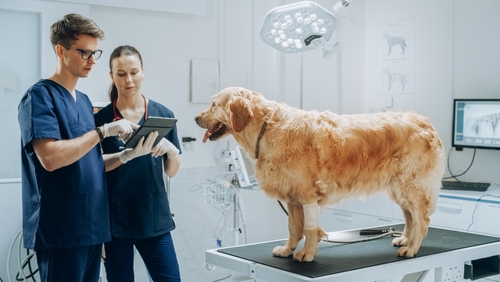Golden Retrievers are beloved for their friendly demeanor, loyalty, and intelligence. However, like all dog breeds, they are prone to specific health issues. As responsible pet owners, understanding these conditions and how to prevent or manage them is vital to ensuring your Golden Retriever lives a long, healthy, and happy life. In this blog post, we’ll explore the most common health issues affecting Golden Retrievers and actionable steps you can take to prevent them.
1. Hip Dysplasia
What Is It?
Hip dysplasia is a genetic condition where the hip joint develops abnormally, leading to joint instability. Over time, this condition can cause arthritis and discomfort, especially in older dogs.
Signs and Symptoms
Limping or stiffness in the hind legs
Difficulty rising, jumping, or climbing stairs
Decreased activity or reluctance to exercise
Prevention and Management
Breeder Screening: Ensure your puppy comes from a reputable breeder who tests for hip dysplasia in their breeding dogs.
Weight Management: Keeping your dog at a healthy weight reduces stress on the joints.
Exercise: Avoid high-impact activities, especially in puppies, as their joints are still developing.
Supplements: Omega-3 fatty acids and glucosamine can promote joint health. Consult your vet for recommendations.
2. Elbow Dysplasia
What Is It?
Elbow dysplasia is another joint disorder that occurs when the bones in the elbow joint do not fit together properly, leading to pain and arthritis.
Signs and Symptoms
Limping or favoring one front leg
Swelling around the elbow
Decreased range of motion in the joint
Prevention and Management
Screening: Like hip dysplasia, choosing a breeder who tests for elbow dysplasia is essential.
Exercise Moderation: Avoid activities that strain the front legs, such as jumping or excessive running on hard surfaces.
Physical Therapy: Hydrotherapy or low-impact exercises can improve mobility.
3. Cancer
What Is It?
Golden Retrievers have a higher-than-average risk of developing cancer, with lymphoma and hemangiosarcoma being the most common types. Studies suggest that nearly 60% of Golden Retrievers may develop cancer in their lifetime.
Signs and Symptoms
Lumps or masses
Lethargy
Unexplained weight loss
Difficulty breathing or sudden weakness
Prevention and Management
Early Detection: Regular vet checkups and monitoring for unusual lumps are critical.
Diet and Lifestyle: A healthy diet rich in antioxidants may help reduce cancer risks.
Spaying/Neutering: Consult your vet about the best timing for this procedure, as it may influence cancer risk.
4. Hypothyroidism
What Is It?
Hypothyroidism occurs when the thyroid gland does not produce enough hormones, leading to a slower metabolism.
Signs and Symptoms
Weight gain without increased appetite
Lethargy or lack of energy
Dry or thinning coat
Skin infections
Prevention and Management
Regular Testing: Hypothyroidism is typically diagnosed through blood tests. Annual wellness checks can help catch it early.
Medication: If your dog is diagnosed, hypothyroidism is easily managed with daily thyroid hormone replacement therapy.
5. Heart Issues: Subvalvular Aortic Stenosis (SAS)
What Is It?
SAS is a genetic condition where the aorta narrows, making it harder for the heart to pump blood. This condition is common in Golden Retrievers and can lead to heart failure if untreated.
Signs and Symptoms
Fatigue or exercise intolerance
Fainting or collapse
Difficulty breathing
Prevention and Management
Breeder Testing: Ensure your breeder screens for heart conditions.
Veterinary Monitoring: Regular heart checkups can detect murmurs or irregularities early.
Medication: In some cases, beta-blockers or other medications may be prescribed to manage symptoms.
6. Skin Allergies
What Are They?
Golden Retrievers are prone to skin allergies, often caused by environmental factors (pollen, dust mites) or food sensitivities. These allergies can lead to itching, irritation, and secondary infections.
Signs and Symptoms
Excessive scratching or licking
Red or inflamed skin
Hair loss or bald spots
Ear infections
Prevention and Management
Dietary Changes: Switch to a high-quality diet free of common allergens like wheat, soy, or artificial additives.
Regular Grooming: Bathe your dog with hypoallergenic shampoos and brush their coat frequently to reduce allergens.
Veterinary Care: Allergy testing can help identify triggers, and medications like antihistamines or corticosteroids may be prescribed.
7. Ear Infections
What Are They?
Golden Retrievers have floppy ears, which can trap moisture and create a breeding ground for bacteria and yeast, leading to ear infections.
Signs and Symptoms
Red or swollen ears
Unpleasant odor
Frequent head shaking or scratching at the ears
Discharge from the ears
Prevention and Management
Regular Cleaning: Use a vet-approved ear cleaner to remove debris and moisture.
Drying Ears: After swimming or bathing, dry your dog’s ears thoroughly.
Diet: Some ear infections are linked to allergies, so addressing food sensitivities can help.
8. Obesity
What Is It?
Golden Retrievers are prone to weight gain, which can lead to a host of health problems, including diabetes, joint issues, and heart disease.
Signs and Symptoms
Excessive weight gain
Difficulty moving or exercising
Fat deposits around the body
Prevention and Management
Portion Control: Measure your dog’s food and avoid overfeeding. Treats should be given in moderation.
Exercise: Golden Retrievers need at least 60 minutes of exercise daily, including walks, playtime, or swimming.
Regular Checkups: Your vet can monitor your dog’s weight and provide guidance on maintaining a healthy lifestyle.
9. Bloat (Gastric Dilatation-Volvulus)
What Is It?
Bloat is a life-threatening condition where the stomach twists, trapping gas and cutting off blood supply. Large, deep-chested breeds like Golden Retrievers are at risk.
Signs and Symptoms
Distended abdomen
Restlessness or pacing
Unproductive vomiting
Rapid breathing or drooling
Prevention and Management
Meal Management: Feed your dog smaller, more frequent meals rather than one large meal.
Avoid Exercise After Eating: Wait at least an hour after meals before engaging in vigorous activity.
Know the Signs: Immediate veterinary care is essential if you suspect bloat.
10. Eye Conditions
What Are They?
Golden Retrievers are susceptible to several eye issues, including cataracts, progressive retinal atrophy (PRA), and glaucoma.
Signs and Symptoms
Cloudy or hazy eyes
Difficulty seeing at night or in low light
Redness or swelling around the eyes
Prevention and Management
Screening: Regular eye exams can detect problems early.
Breeder Testing: Ensure your breeder tests for PRA and other hereditary eye conditions.
Surgery: In severe cases, cataract surgery or other procedures may be necessary.


